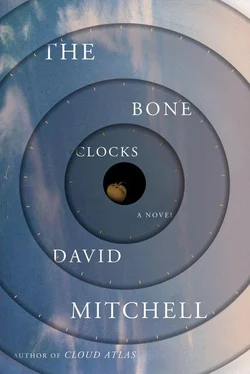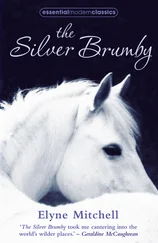The barman’s shaking a cocktail-maker. My friend watches with a discerning eye. “That guy knows what he’s doing.”
Again, I hesitate. “Do you know anything about Multiple Personality Disorder?”
“Yes. As a mature student, I wrote a thesis on it. It had a namechange in the 1990s to Disassociative Identity Disorder but, even by the standards of clinical psychiatry, its presentation is obscure.” Holly fingers an earring. “It may explain things like Rottnest, but what about the precognition? Old Mr. Sharkey? Or how about when Aoife was little and we were at Sharon’s wedding in Brighton and she took it into her head to run off, and a certainty spoke through me the very number of the room she’d got locked herself into? How could I have known that, Crispin? How? How could I’ve made that up?”
A group of East Asian businessmen explodes into laughter.
“What if your memory is inverting cause and effect?”
Holly looks blank, drinks her wine, and still looks blank.
“Take Rebecca Wotsit’s coffee. Normally, your brain sees the cup knocked over first, and stores the memory of that event second. What if some neural glitch causes your brain to reverse the order — so the memory of the cup smashing on the floor was stored first, before your memory of the cup sitting on the edge of the table. That way, you believe in all sincerity that action B comes before A.”
Holly looks at me like I just don’t get it. “Lend us a coin.”
I fish out a two-pound coin from the international collection that lives in my wallet. She holds it in her left palm, then, with the middle finger of her right hand, touches a spot on her forehead. I ask, “What’s that in aid of?”
“Dunno, it just helps. Buddhism talks about a third eye in the forehead, but … Shush a mo.” She shuts her eyes, and tilts her head. Like a dog listening to silence. The background bar noises — low-key chat, ice cubes in glasses, Keith Jarrett’s “My Wild Irish Rose”—swell and recede. Holly hands me back the coin. “Flip it. Should be heads.”
I flip the coin. “It’s heads.” Fifty-fifty.
“Heads again,” says Holly, concentrating.
I flip the coin. “So it is.” One in four against.
“Tails this time,” says Holly. Her finger stays on her forehead.
I flip the coin: It’s tails. “Three out of three. Not bad.”
“Back to heads.”
I flip the coin: It’s heads.
“Tails,” says Holly.
I flip the coin: It’s tails. “How are you doing this?”
“Let’s try a sequence,” says Holly. “Heads, heads, heads, tails, and … tails again, but … kneeling ? Crispin, why are you kneeling?”
“As you can see, I’m sitting here, not kneeling.”
“Forget it. Three heads, two tails, in that order.”
So I flip the coin: heads. And again: heads. How’s she doing this? I rub the coin on my shirt, like a scratched disk, then flip it: heads, as predicted. “This is clever,” I say, but I feel uneasy.
She’s irritated by the adjective. “Two tails, now.”
I flip the coin: tails. Nine out of nine. On the tenth flip, I fumble the catch and the coin goes freewheeling away. I give chase, and only when I draw it out from under a chair and see it’s tails do I realize that I’m kneeling. Holly looks like someone being given the answer to a simple riddle. “Obviously. The coin runs away.”
As I retake my seat, I don’t quite trust myself to speak.
“Odds of 1,024 to 1 against a ten-digit sequence, if you’re wondering. We can increase it to 4,096 to 1 with two more throws?”
“No need.” My voice is tight. I look at Holly Sykes: Who is she? “That kneeling thing. How …”
“Maybe your brain is mistaking memories for predictions, too.” Holly Sykes looks not at all like a magician whose ambitious trick just went perfectly, but like a tired woman who needs to gain a few pounds. “Oh, Christ, that was a mistake. You’re looking at me in that way.”
“In what way?”
“Look, Crispin, can we just forget all of this? I need my bed.”
• • •
WE WALK TO the lift lobby without much to say. A pair of terracotta warriors don’t think very much of me, judging from their expressions. “You’ve got a gazillion true believers who’d pay a year of their lives to see what you just showed me,” I tell Holly. “I’m a cynical bastard, as you well know. Why honor me with that private demonstration?”
Now Holly looks pained. “I hoped you might believe me.”
“About what? About your Radio People? Rottnest? About—”
“That evening in Hay-on-Wye, in the signing tent. We were sat a few yards away. I had a strange strong certainty. About you.”
The lift doors close, and I remember from Zoë’s flirtation with feng shui that lifts are jaws that eat good luck. “Me?”
“You. And it’s an odd one. And it’s never changed.”
“Well, what’s it saying about me, for heaven’s sake?”
She swallows. “ ‘A spider, a spiral, a one-eyed man.’ ”
I wait for an explanation. None comes. “Meaning?”
Holly looks cornered. “I have absolutely no idea.”
“But you usually find out what they mean after, right?”
“Usually. Eventually. But this is a … slow-cooking certainty.”
“ ‘A spider, a spiral, a one-eyed man’? What is that? A shopping list? A dance track? A line from a sodding haiku?”
“Crispin, if I knew, I’d tell you, I swear.”
“Then it may just be random gobbledegook.”
Holly agrees too easily. “Probably, yes. Yep. Forget it.”
An elderly Chinese guy in a pink Lacoste top, fudge-brown slacks, and golf shoes steps out of the lift. Hooked onto his arm is a blond model wearing a négligé sewn of cobwebs and gold coins, extraplanetary makeup, and not a lot else. They go around a corner.
“Maybe she’s his daughter,” says Holly.
“What did you mean just then, ‘It’s never changed’?”
Holly, I expect, regrets having started this. “In Cartagena, at the president’s house, I heard the same certainty. Same words. At Rottnest, too, before I started channeling. And now, if I tune in. I did the coin thing so you might take the spiral-spider-one-eyed-man thing seriously, in case it’s ever …” she shrugs, “… relevant.”
The lifts hum in their turboshafts. “What’s the use of certainties,” I ask, “that are so sodding uncertain?”
“Oh, I don’t know , Crispin. I’m not a bloody oracle. If I could stop them I would, like a bloody shot!”
These uncensored stupid words spill out: “You’ve profited from them well enough.”
Holly looks shocked, hurt, then pissed off, all in under five seconds. “ Yes , I wrote The Radio People because stupidly, stupidly , I thought if Jacko’s alive and out there somewhere”—she sweeps an angry hand at the borderless city through the window—“he might read it, or someone who knows him might recognize him and get in touch. Fat bloody chance ’cause he’s probably dead but I had to try. But I endure my certainties. I live despite them. Don’t say I profit from them. Don’t dare bloody say that, Crispin.”
“Yeah.” I close my eyes. “Look, it came out wrong. I …”
My crimes, my misdeeds. Where do I sodding begin?
Then I hear the lift doors close. Great. She’s gone.
AS I SHAMBLE back to my room, I send a text to Holly to apologize. I’ll phone in the morning after we’ve both had a decent night’s sleep, and we’ll meet for breakfast. I arrive at Room 2929, where I find a black bag hung over my door handle. It’s embroidered with runes in gold thread: a real labor of love. Inside is a book entitled Your Last Chance by Soleil Moore. Never heard of her. Or him. I already know it’s dreck. No real poet would be rude enough to imagine that I’d read unsolicited sonnets, just because of a hand-embroidered bag. How did she find out my room number? We’re in China. Bribes, of course. Not at the Shanghai Mandarin, surely. Ah, who cares? I’m so — soddingly — buggeringly— tired . I just go into my room, dump the book still in its lovely bag into the deep bin with the detritus of the day, empty my grateful bladder, crawl into bed, and sleep opens up like a sink-hole …
Читать дальше












